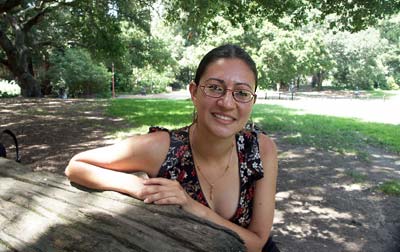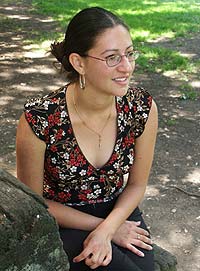UC Berkeley Web Feature
 |
Maria-Esteli Garcia, Latin American Studies major and University Medal finalist. (BAP photos) |
Would-be physician Maria Garcia gives back to the Latin-American community
BERKELEY – When University Medal finalist Maria-Esteli Garcia advises fellow students to "go with the flow and be open to different experiences" as they consider career paths, she knows what she's talking about. A chance discovery during a summer 2001 research project opened the Latin-American Studies major's eyes to what she wanted to do: become a doctor who specializes in public health.
The University Medal
Finalists: |
A Spring 2000 class trip to Zunil, Guatemala, for a Native American Studies course interested Garcia in doing research on people who migrate to the U.S. She returned that summer and the next, living with a local family and earning the trust of the K'iche' Mayan community through participation in school and church groups. Garcia later turned the hundreds of hours of interviews with returned migrants and their families into a paper for an independent study course on U.S. immigration.
While doing her research, Garcia was astounded to learn that eight people in Zunil (population 15,000) had died from AIDS that year. "It's incredible that this community, which is so reserved in its sexual values, could have that many cases," she says. "It really brought home to me how everything is affected by migration. We usually only look at migration in terms of its effect on the receiving community, but we also need to think about what happens when migrants return home. I had been thinking about going to medical school, but public health is just as, if not more, important - you can't treat AIDS in these communities without taking into account the cultural issues."
Making the most of culture
Garcia has personal experience with migration issues. Although her parents met at Berkeley while her father was a master's candidate at Cal, they moved to Puebla, Mexico before she was born. (Her father is from Puebla; her mother, from Puerto Rico. Both are teachers.) She lived in this bustling, Spanish colonial city until she was seven, when the Garcias moved back to Berkeley to give their children better educational opportunities. Her father was also studying for his Ph.D. in mathematics at UC Berkeley. After she took classes at UC Berkeley while still a senior at Berkeley High School, it seemed only natural for Maria to follow her elder sister in enrolling at Cal.
After her trip to Guatemala, Garcia set about learning more about Latin American health care and culture. She spent the Spring 2002 semester abroad at the Pontifical Catholic University in Rio de Janeiro, Brazil, taking classes on social welfare and Brazilian literature, then set out to gain practical knowledge of community health education in Brazil. For the Fall 2002 semester, she interned at the Holistic Reference Center for Adolescents (for which the Portuguese acronym is CRIA), in Salvador, Bahia, Brazil.
CRIA mounts cultural programs using theater and poetry to educate young people about difficult health issues. "Culture is much more tangible there, in the sense that everybody can play an instrument and sing, in a way that's not incorporated in our daily life here in the States," explains Garcia. It is, however, part of the Garcias' daily life. Her father plays numerous instruments; Garcia herself practices ballet folklorico and West African dance, and has dabbled in capoeira, the Brazilian combination of martial arts and dance.
 'For children of immigrants, there's a lot of family pressure to be only a doctor, a lawyer, or an engineer. I tell students that you have to explore different options to know what career will make you happy, and not to be disappointed if your idea of what you want to do changes.' -Maria-Esteli Garcia |
At CRIA, she helped with workshops that traveled to schools and religious centers seeking to inform schoolchildren about different forms of sexual abuse, and what to do if they experience it. The following summer, she interned at the National Latina Health Organization, a nonprofit that teaches young Latina girls about health and sexuality as well as provides them academic support.
Eager to help
Garcia has always felt a responsibility to give back to her community, dating from her selection as a freshman to be a Biology Scholar, a program funded by the Howard Hughes Medical Institute to increase the participation and success of students from diverse backgrounds who want to study biology. The Biology Scholars Program (BSP) helps such students access campus resources more effectively, but its real strength, says Garcia, is in the informal advising and help that goes on among the students. "BSP has been the core of my experiences here," she says emphatically. "The administrators are so supportive, and it's almost given me a warped view, by surrounding me with so many underrepresented minority students compared to the general population."
Even though Garcia graduated in December, she continues to drop in at BSP's offices to help students choose their classes and majors, and also to tutor organic chemistry at the Academic Center. She feels it's important to remind other underrepresented minority students that they aren't limited to any one path at Berkeley. "For children of immigrants, there's a lot of family pressure to be only a doctor, a lawyer, or an engineer," she says. "I tell them that you have to explore different options to know what career will make you happy, and not to be disappointed if your idea of what you want to do changes."
To those who are sure that they want to study medicine, she offers her own experience as a guide: "Lots of freshmen think in order to be premed, you have to major in Molecular and Cell Biology. They're surprised to hear you can major in something like Latin American Studies and still go to medical school."
Garcia also continues to send money back to Zunil to enable several children to attend school. "Even though the public education is free, the cost of books and uniforms is too prohibitive for many students and the families also have to worry about lost income, since often the children help their parents work in the fields," she says. Garcia has enlisted several American friends to sponsor Zunil students with her. "You feel like you should be able to do more, because they don't need that much. Just $50 a year will make it possible for a Zunil child to attend elementary school."
After some time off spent tutoring and playing soccer, and perhaps returning to Brazil for a more hands-on internship in a medical field, Garcia intends to apply to joint M.D. and master's of public health programs for next year. Her ultimate goal is to work in a community clinic, rather than a less personal hospital setting. "There's such a need for Latina professionals willing to work within the community, and public health is just one area where individuals can make a big difference with small contributions," she says.
John Matsui, the director of the Biology Scholars Program, thinks Garcia is one of those who will have a big impact. "She has that rare combination of intellect and compassion that one only occasionally finds among students heading toward a medical career," Matsui wrote in a letter recommending her for the University Medal. "In my judgment, she will some day be the kind of physician that I would choose to see myself, and colleague with whom I would choose to work."


 University
Medalist Margaret Ann-Chia Chow urges new students
to make campus "feel like home"
University
Medalist Margaret Ann-Chia Chow urges new students
to make campus "feel like home" Leadership
depends on dialogue, says ex-ASUC president Jesse
Gabriel
Leadership
depends on dialogue, says ex-ASUC president Jesse
Gabriel From
Istanbul to Berkeley, Perin Gurel is on the
lookout for new challenges
From
Istanbul to Berkeley, Perin Gurel is on the
lookout for new challenges David
Young relies on faith and family to bring
his vision to life
David
Young relies on faith and family to bring
his vision to life Would-be
physician Maria Garcia gives back to the
Latin-American community
Would-be
physician Maria Garcia gives back to the
Latin-American community After
changing her major and her mind, Deann Del Rio
takes on modern medicine
After
changing her major and her mind, Deann Del Rio
takes on modern medicine